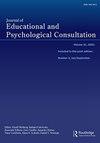关于咨询的思考:运用混乱和公平的实施视角帮助学校心理学家打破差异
IF 1.1
4区 心理学
Q4 PSYCHOLOGY, EDUCATIONAL
Journal of Educational and Psychological Consultation
Pub Date : 2022-10-07
DOI:10.1080/10474412.2022.2131558
引用次数: 1
摘要
摘要学校心理学家可以通过咨询来解决教育机会的不平等问题,以支持被边缘化的学生。这项关键工作被编入NASP 2020实践模型,该模型概述了专业和组织原则,以促进学校心理学家参与对学生、学校和家庭的公平、有效的支持。然而,基于白人至上主义的关于种族和能力的历史信仰的遗产已经以复杂的方式交织在一起,这在包括咨询在内的多个学校生态中都很明显。在本文中,我们应用DisCrit,这是一个理论框架,通过整合批判性种族理论和残疾研究,结合了对种族和能力的双重分析,对解决问题的咨询结构、作用和目的进行了概念回顾。接下来,我们强调了将公平执行这一执行科学的新兴视角纳入协商的潜力。当强有力的公平组成部分(如信任关系、社区定义的证据)融入实施过程以促进项目的高质量交付时,就会出现公平实施。有了这个观点和一个有插图的案例研究,我们希望为研究人员和从业者提供可操作的步骤,将破坏有问题的生态和促进公平作为他们咨询的基础。我们还反思了与NASP 2020实践模型相一致的培训和实践的机遇、挑战和影响。本文章由计算机程序翻译,如有差异,请以英文原文为准。
Reflections on Consultation: Applying a DisCrit and Equitable Implementation Lens to Help School Psychologists Disrupt Disparities
ABSTRACT School psychologists can engage in consultation to address inequities in educational opportunities to support multiply marginalized students. This critical work is codified in the NASP 2020 Practice Model, which outlines professional and organizational principles to facilitate school psychologists’ engagement in equitable, effective supports to students, schools, and families. However, the legacy of historical beliefs about race and ability, based on white supremacy, have become intertwined in complex ways that are evident within and across multiple school ecologies, including consultation. In this paper, we apply DisCrit, a theoretical framework that incorporates a dual analysis of race and ability through an integration of critical race theory and disability studies, to provide a conceptual review of problem-solving consultation structure, roles, and purpose. Next, we highlight the potential of embedding equitable implementation, an emerging perspective from implementation science, into consultation. Equitable implementation occurs when strong equity components (e.g., trusting relationships, community-defined evidence) are integrated into the implementation process to facilitate quality delivery of programs. With this perspective and an illustrated case study, we hope to provide actionable steps for researchers and practitioners to center disrupting problematic ecologies and advancing equity as foundational in their consultation. We also reflect on opportunities, challenges, and implications for training and practice that are aligned with the NASP 2020 Practice Model.
求助全文
通过发布文献求助,成功后即可免费获取论文全文。
去求助
来源期刊

Journal of Educational and Psychological Consultation
PSYCHOLOGY, EDUCATIONAL-
CiteScore
3.40
自引率
23.50%
发文量
20
期刊介绍:
The Journal of Educational & Psychological Consultation (JEPC) provides a forum for improving the scientific understanding of consultation and for describing practical strategies to increase the effectiveness and efficiency of consultation services. Consultation is broadly defined as a process that facilitates problem solving for individuals, groups, and organizations. JEPC publishes articles and special thematic issues that describe formal research, evaluate practice, examine the program implementation process, review relevant literature, investigate systems change, discuss salient issues, and carefully document the translation of theory into practice.
 求助内容:
求助内容: 应助结果提醒方式:
应助结果提醒方式:


